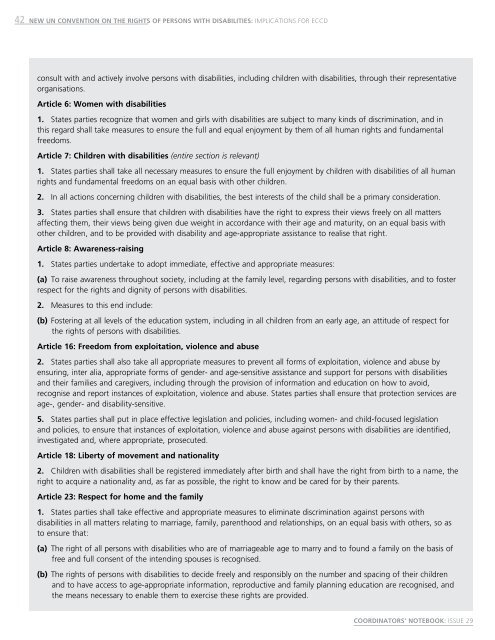A global call to action for early childhood
A global call to action for early childhood
A global call to action for early childhood
You also want an ePaper? Increase the reach of your titles
YUMPU automatically turns print PDFs into web optimized ePapers that Google loves.
42 New UN Convention on the Rights of Persons with Disabilities: Implications <strong>for</strong> ECCD<br />
consult with and actively involve persons with disabilities, including children with disabilities, through their representative<br />
organisations.<br />
Article 6: Women with disabilities<br />
1. States parties recognize that women and girls with disabilities are subject <strong>to</strong> many kinds of discrimination, and in<br />
this regard shall take measures <strong>to</strong> ensure the full and equal enjoyment by them of all human rights and fundamental<br />
freedoms.<br />
Article 7: Children with disabilities (entire section is relevant)<br />
1. States parties shall take all necessary measures <strong>to</strong> ensure the full enjoyment by children with disabilities of all human<br />
rights and fundamental freedoms on an equal basis with other children.<br />
2. In all <strong>action</strong>s concerning children with disabilities, the best interests of the child shall be a primary consideration.<br />
3. States parties shall ensure that children with disabilities have the right <strong>to</strong> express their views freely on all matters<br />
affecting them, their views being given due weight in accordance with their age and maturity, on an equal basis with<br />
other children, and <strong>to</strong> be provided with disability and age-appropriate assistance <strong>to</strong> realise that right.<br />
Article 8: Awareness-raising<br />
1. States parties undertake <strong>to</strong> adopt immediate, effective and appropriate measures:<br />
(a) To raise awareness throughout society, including at the family level, regarding persons with disabilities, and <strong>to</strong> foster<br />
respect <strong>for</strong> the rights and dignity of persons with disabilities.<br />
2. Measures <strong>to</strong> this end include:<br />
(b) Fostering at all levels of the education system, including in all children from an <strong>early</strong> age, an attitude of respect <strong>for</strong><br />
the rights of persons with disabilities.<br />
Article 16: Freedom from exploitation, violence and abuse<br />
2. States parties shall also take all appropriate measures <strong>to</strong> prevent all <strong>for</strong>ms of exploitation, violence and abuse by<br />
ensuring, inter alia, appropriate <strong>for</strong>ms of gender- and age-sensitive assistance and support <strong>for</strong> persons with disabilities<br />
and their families and caregivers, including through the provision of in<strong>for</strong>mation and education on how <strong>to</strong> avoid,<br />
recognise and report instances of exploitation, violence and abuse. States parties shall ensure that protection services are<br />
age-, gender- and disability-sensitive.<br />
5. States parties shall put in place effective legislation and policies, including women- and child-focused legislation<br />
and policies, <strong>to</strong> ensure that instances of exploitation, violence and abuse against persons with disabilities are identified,<br />
investigated and, where appropriate, prosecuted.<br />
Article 18: Liberty of movement and nationality<br />
2. Children with disabilities shall be registered immediately after birth and shall have the right from birth <strong>to</strong> a name, the<br />
right <strong>to</strong> acquire a nationality and, as far as possible, the right <strong>to</strong> know and be cared <strong>for</strong> by their parents.<br />
Article 23: Respect <strong>for</strong> home and the family<br />
1. States parties shall take effective and appropriate measures <strong>to</strong> eliminate discrimination against persons with<br />
disabilities in all matters relating <strong>to</strong> marriage, family, parenthood and relationships, on an equal basis with others, so as<br />
<strong>to</strong> ensure that:<br />
(a) The right of all persons with disabilities who are of marriageable age <strong>to</strong> marry and <strong>to</strong> found a family on the basis of<br />
free and full consent of the intending spouses is recognised.<br />
(b) The rights of persons with disabilities <strong>to</strong> decide freely and responsibly on the number and spacing of their children<br />
and <strong>to</strong> have access <strong>to</strong> age-appropriate in<strong>for</strong>mation, reproductive and family planning education are recognised, and<br />
the means necessary <strong>to</strong> enable them <strong>to</strong> exercise these rights are provided.<br />
COORDINATORS’ NOTEBOOK: ISSUE 29
















